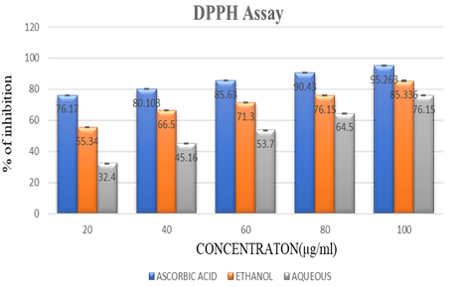Abstract
Carcinoma or cancer of the stomach is one of the common malignancies of older men. Numerous methods of treatment options, including herbal and plant products, have been described for its management. The leaves of citrus medica or the naarthai leaves as it has been named traditionally do possess activities in the gastric mucosa. Hence, we decided to extract the phytochemicals from the leaves and find out the antioxidant, cytotoxic potential of the same. After confirmation of the leaves from appropriate authorities, petroleum ether, ethanolic and aqueous extracts of the leaves were made. The IC 50 was found to 200 micrograms and tested for cytotoxicity and apoptotic abilities in the AGS human gastric cell lines. The ethanolic extract showed maximal phytoconstituents. The aqueous extract showed 76.15% of scavenging effect, whereas the ethanolic extract showed 85.33% scavenging activity. Regarding the cytotoxicity effect of C. medica extract on the AGS cell line, it was observed that the percentage of cells was reduced to 50% in the treatment group when compared to the control group. The cells treated with ethanolic leaf extract of C. medica were arrested in G0−G1. Late apoptosis was significantly increased in the treated group when compared to the control group. The ethanolic leaf extracts of citrus medica possessed antioxidant and anti-cancer properties in gastric mucosal lines. This option can be considered for further production of drugs from such plants.
Full text article
Authors

This work is licensed under a Creative Commons Attribution-NonCommercial-NoDerivatives 4.0 International License.

